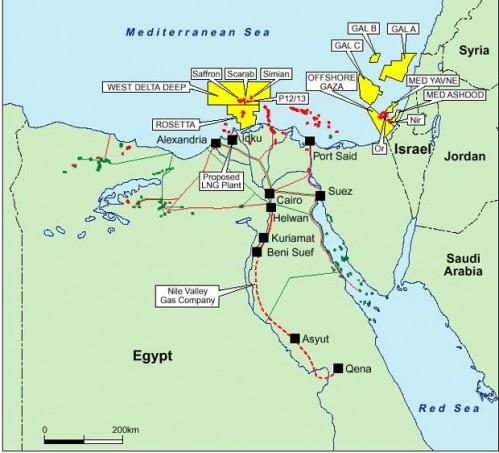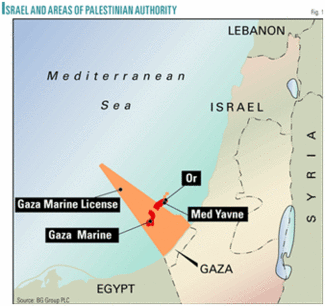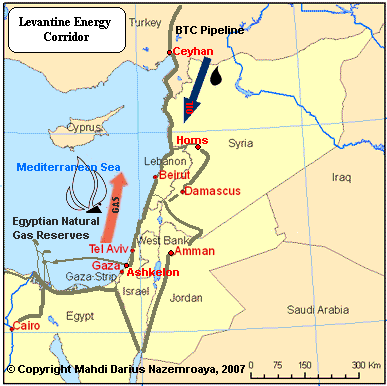War in Gaza = War Over Natural Gas?
We extensively documented that the wars in the Middle East and North Africa are largely about oil and gas. (Update: Iran has just started building its gas pipeline to Syria.)
As Professor Michel Chossudovsky noted in 2009, gas may be a central reason for the war over Gaza as well:
This is a war of conquest. Discovered in 2000, there are extensive gas reserves off the Gaza coastline.
British Gas (BG Group) and its partner, the Athens based Consolidated Contractors International Company (CCC) owned by Lebanon’s Sabbagh and Koury families, were granted oil and gas exploration rights in a 25 year agreement signed in November 1999 with the Palestinian Authority.
The rights to the offshore gas field are respectively British Gas (60 percent); Consolidated Contractors (CCC) (30 percent); and the Investment Fund of the Palestinian Authority (10 percent). (Haaretz, October 21, 2007).
The PA-BG-CCC agreement includes field development and the construction of a gas pipeline.(Middle East Economic Digest, Jan 5, 2001).
The BG licence covers the entire Gazan offshore marine area, which is contiguous to several Israeli offshore gas facilities. (See Map below). It should be noted that 60 percent of the gas reserves along the Gaza-Israel coastline belong to Palestine.
The BG Group drilled two wells in 2000: Gaza Marine-1 and Gaza Marine-2. Reserves are estimated by British Gas to be of the order of 1.4 trillion cubic feet, valued at approximately 4 billion dollars. These are the figures made public by British Gas. The size of Palestine’s gas reserves could be much larger.
Who Owns the Gas Fields
The issue of sovereignty over Gaza’s gas fields is crucial. From a legal standpoint, the gas reserves belong to Palestine.
The death of Yasser Arafat, the election of the Hamas government and the ruin of the Palestinian Authority have enabled Israel to establish de facto control over Gaza’s offshore gas reserves.
British Gas (BG Group) has been dealing with the Tel Aviv government. In turn, the Hamas government has been bypassed in regards to exploration and development rights over the gas fields.
The election of Prime Minister Ariel Sharon in 2001 was a major turning point. Palestine’s sovereignty over the offshore gas fields was challenged in the Israeli Supreme Court. Sharon stated unequivocally that “Israel would never buy gas from Palestine” intimating that Gaza’s offshore gas reserves belong to Israel.
In 2003, Ariel Sharon, vetoed an initial deal, which would allow British Gas to supply Israel with natural gas from Gaza’s offshore wells. (The Independent, August 19, 2003)
The election victory of Hamas in 2006 was conducive to the demise of the Palestinian Authority, which became confined to the West Bank, under the proxy regime of Mahmoud Abbas.
In 2006, British Gas “was close to signing a deal to pump the gas to Egypt.” (Times, May, 23, 2007). According to reports, British Prime Minister Tony Blair intervened on behalf of Israel with a view to shunting the agreement with Egypt.
The following year, in May 2007, the Israeli Cabinet approved a proposal by Prime Minister Ehud Olmert “to buy gas from the Palestinian Authority.” The proposed contract was for $4 billion, with profits of the order of $2 billion of which one billion was to go the Palestinians.
Tel Aviv, however, had no intention on sharing the revenues with Palestine. An Israeli team of negotiators was set up by the Israeli Cabinet to thrash out a deal with the BG Group, bypassing both the Hamas government and the Palestinian Authority:
“Israeli defence authorities want the Palestinians to be paid in goods and services and insist that no money go to the Hamas-controlled Government.” (Ibid, emphasis added)
The objective was essentially to nullify the contract signed in 1999 between the BG Group and the Palestinian Authority under Yasser Arafat.
Under the proposed 2007 agreement with BG, Palestinian gas from Gaza’s offshore wells was to be channeled by an undersea pipeline to the Israeli seaport of Ashkelon, thereby transferring control over the sale of the natural gas to Israel.
The deal fell through. The negotiations were suspended:
”Mossad Chief Meir Dagan opposed the transaction on security grounds, that the proceeds would fund terror”. (Member of Knesset Gilad Erdan, Address to the Knesset on “The Intention of Deputy Prime Minister Ehud Olmert to Purchase Gas from the Palestinians When Payment Will Serve Hamas,” March 1, 2006, quoted in Lt. Gen. (ret.) Moshe Yaalon, Does the Prospective Purchase of British Gas from Gaza’s Coastal Waters Threaten Israel’s National Security? Jerusalem Center for Public Affairs, October 2007)
Israel’s intent was to foreclose the possibility that royalties be paid to the Palestinians. In December 2007, The BG Group withdrew from the negotiations with Israel and in January 2008 they closed their office in Israel.(BG website).
Invasion Plan on The Drawing Board
The invasion plan of the Gaza Strip under “Operation Cast Lead” was set in motion in June 2008, according to Israeli military sources:
“Sources in the defense establishment said Defense Minister Ehud Barak instructed the Israel Defense Forces to prepare for the operation over six months ago [June or before June] , even as Israel was beginning to negotiate a ceasefire agreement with Hamas.”(Barak Ravid, Operation “Cast Lead”: Israeli Air Force strike followed months of planning, Haaretz, December 27, 2008)
That very same month, the Israeli authorities contacted British Gas, with a view to resuming crucial negotiations pertaining to the purchase of Gaza’s natural gas:
“Both Ministry of Finance director general Yarom Ariav and Ministry of National Infrastructures director general Hezi Kugler agreed to inform BG of Israel’s wish to renew the talks.
The sources added that BG has not yet officially responded to Israel’s request, but that company executives would probably come to Israel in a few weeks to hold talks with government officials.” (Globes online- Israel’s Business Arena, June 23, 2008)
The decision to speed up negotiations with British Gas (BG Group) coincided, chronologically, with the planning of the invasion of Gaza initiated in June. It would appear that Israel was anxious to reach an agreement with the BG Group prior to the invasion, which was already in an advanced planning stage.
Moreover, these negotiations with British Gas were conducted by the Ehud Olmert government with the knowledge that a military invasion was on the drawing board. In all likelihood, a new “post war” political-territorial arrangement for the Gaza strip was also being contemplated by the Israeli government.
In fact, negotiations between British Gas and Israeli officials were ongoing in October 2008, 2-3 months prior to the commencement of the bombings on December 27th.
In November 2008, the Israeli Ministry of Finance and the Ministry of National Infrastructures instructed Israel Electric Corporation (IEC) to enter into negotiations with British Gas, on the purchase of natural gas from the BG’s offshore concession in Gaza. (Globes, November 13, 2008)
“Ministry of Finance director general Yarom Ariav and Ministry of National Infrastructures director general Hezi Kugler wrote to IEC CEO Amos Lasker recently, informing him of the government’s decision to allow negotiations to go forward, in line with the framework proposal it approved earlier this year.
The IEC board, headed by chairman Moti Friedman, approved the principles of the framework proposal a few weeks ago. The talks with BG Group will begin once the board approves the exemption from a tender.” (Globes Nov. 13, 2008)
Gaza and Energy Geopolitics
The military occupation of Gaza is intent upon transferring the sovereignty of the gas fields to Israel in violation of international law.
***
These various offshore installations are also linked up to Israel’s energy transport corridor, extending from the port of Eilat, which is an oil pipeline terminal, on the Red Sea to the seaport – pipeline terminal at Ashkelon, and northwards to Haifa, and eventually linking up through a proposed Israeli-Turkish pipeline with the Turkish port of Ceyhan.
Ceyhan is the terminal of the Baku, Tblisi Ceyhan Trans Caspian pipeline. “What is envisaged is to link the BTC pipeline to the Trans-Israel Eilat-Ashkelon pipeline, also known as Israel’s Tipline.” (See Michel Chossudovsky, The War on Lebanon and the Battle for Oil, Global Research, July 23, 2006)
Is Middle Eastern politics boiling down – yet again – to oil and gas?
Bonus: Hamas Shouldn’t Fire Rockets … But Israel Has Violated HUNDREDS of UN Resolutions
Source: http://www.investingchannel.com
Life After Death Strongly Suggests Obama Knew About Benghazi And Petraeus
Sec. Defense was recently asked — point blank — whether or not he knew about the alleged Petraeus affair. He replied that “He did not know the answer to that!!!” The only way that you cannot know if you knew is if you’re dead — physically, or mentally. So, if Peneta was telling the truth and he does not know if he knew, he is admitting he is dead.
Many parts of the body live long after the brain, lungs and heart cease to function. Bureaucracies are much the same way: they continue to function long after the head of a government ceases to function. This is the essence of what Reagan meant when he commented that a government bureaucracy is the closest thing to eternal life on earth.
So, how does this “strongly suggest” that Obama knew about Benghazi and Petraeus? Because telling the President about such things have become an institutional part of the bureaucracy surrounding the President: it’s just what the political, military and intelligence arms do. It’s reflexive for the people in these parts of government and political Parties. It strains the bounds of credibility to believe they wouldn’t tell Obama…unless….
Unless Obama actually is an empty suit: a teleprompter reader who holds the position because of the image he presents while his puppet master(s) actually run the organs of government. In all honesty, this would explain two problems with what we’re seeing right now:
First, it would explain how Obama could NOT know about Benghazi and Petraeus. The bureaucracies would still report to the person in charge, it’s just that the person in charge is not Obama.
Second, it would explain why his handlers seldom allow Obama to speak off prompter, and why he so often looks surprised by what is on that teleprompter when he reads his lines. It even explains why he seems to have so much difficulty speaking without stuttering when off prompter: he doesn’t know what he is supposed to say so he actually has to access his independent programming (and that isn’t so good).
You either have to accept that things are not what they appear and start looking for rational reasons to explain the discrepancies, or you have to face the reality we’re being told to accept. We have a drunken, sex-craved Secret Service that is continuously embroiled in scandal. We have a President who doesn’t even know when the U.S. is under military assault by hostile foreign forces. You have a Government that cannot figure out what happened in Fast & Furious, yet it knows about the sex life of the CIA Director. No, no, I was going to list all the scandals associated with this administration that strain the bounds of reason, but that would take too long – especially since it all points to a reality far from that which we’re being told to believe.
HOWEVER, if things are as they appear, then we still have a reason for secession: because – if things are as we’re told they are – then the federal government has ceased to function and the only signs of life are the involuntary actions of the bureaucracies.
Source: The Rio Norte Line
Did Petraeus mistress reveal secret CIA prison (in Benghazi)?
TEL AVIV – Did Paula Broadwell, the alleged mistress of ex-CIA Director David Petraeus, reveal a secret CIA detention center in Benghazi during a public speech she gave last month?
Broadwell, a former counterterror operative, co-authored a bestselling biography of Petraeus, titled “All In.” She discussed the book during a keynote speech on Oct. 26 at a University of Denver alumni symposium. The speech is available in full on YouTube.
The YouTube video was removed within hours of this posting
http://youtu.be/dPaf5OJSskY
During a question-and-answer session, Broadwell was asked about this year’s Sept. 11 attacks against the U.S. mission in Benghazi.
She stated: “Now I don’t know if a lot of you heard this, but the CIA annex had actually had taken a couple of Libya militia members prisoner. And they think that the attack on the consulate was an effort to try to get these prisoners back. So that’s still being vetted.”
The existence of a U.S. prison or CIA detention center in Benghazi would be a new development in the debate surrounding the attacks there. The information does not appear to be publicly known.
An extensive WND search of news media coverage of the Benghazi attacks could find no mention of prisoners being held at the CIA annex.
Yesterday, the New York Times reported that House Majority Leader Eric Cantor spoke to an FBI whistleblower two weeks ago who accused Petraeus of not only having an extramarital affair, but potentially jeopardizing the security of classified information.
During the same university speech, Broadwell may have also divulged information that Petraeus knew “within 24 hours” of CIA annex’s request for reinforcements, reported Israel National News.
“The challenging thing for Gen. Petraeus,” she stated, “is that in his new position, he’s not allowed to communicate with the press. So he’s known all of this – they had correspondence with the CIA station chief in Libya, within 24 hours they kind of knew what was happening.”
Earlier she had said the military could have sent reinforcements.
“They were requesting the – it’s called the C-in-C’s In Extremis Force – a group of Delta Force operators, our very, most talented guys we have in the military. They could have come and reinforced the consulate and the CIA annex.”
Counterterrorism Legal Policy in Obama’s Second Term

An anti-drone protester flashes the victory sign in front of an image of drone during a rally in Karachi. (Reuters)
One important consequence of President Obama’s re-election will be the further entrenchment, and legitimation, of the basic counterterrorism policies that Obama continued, with tweaks, from the late Bush administration. We will have four more years of a Democratic president presiding over military detention without trial, military commission trials (at least for the 9/11 conspirators, if not for more), broad warrantless surveillance, drone strikes around the globe, and covert war more generally. These policies will of course be scrutinized by the many watchers of the presidency. But they will receive less pushback than they would have received under a republican president. Not only does the public generally trust the former constitutional law professor and civil liberties champion more than a republican president to carry out these policies (this is the Nixon going to China phenomenon). But in addition, many on the left (in Congress and the NGO community, and perhaps the press) who might otherwise be uncomfortable with these policies will give President Obama a freer hand than they would a republican president. The paradoxical bottom line: aggressive counterterrorism policies will, as a general matter, become more entrenched as a result of Obama’s election, compared to a Romney presidency.
One objection to this conclusion is that President Obama – more focused on his historical legacy, freed from re-election worries, and less concerned about negative political consequences of counterterrorism policies he deems appropriate – will seek to change course on counterterrorism policy. He is already getting pressure to do so from various quarters. But I doubt that these pressures will lead to large changes in policy.
As I have argued before, these pressures might well lead President Obama to release as many GTMO detainees as possible (e.g. the Yemenis technically cleared for transfer), when (and if) the security situation permits. Whether his administration will continue to push (in the face of congressional opposition) to close GTMO and ramp up civilian trials of GTMO detainees is a harder call, I think. I am sure it wants to do this, all things equal. But I don’t think Congress is going to back down in its opposition to these initiatives, I don’t think the President is going to disregard congressional restrictions in this area, and I don’t think that a large-scale fight on this issue with Congress will be consistent with the administration’s other political goals. That said, the President clearly wants to avoid responsibility for GTMO remaining open after eight years in the oval office, so I think he will continue to disagree with Congress nominally on the issue so that he can later say that he tried his best.
Change could also come on two other issues in the second term. The first is the drone program. By all accounts the U.S. government continues to ramp up reliance on drone intelligence and fire to control terrorist threats around the globe. As John Bellinger has documented, political and legal opposition to this program from around the globe, sometimes strident, is growing. It will be interesting to see how the Obama administration deals with this. Will it tone down reliance on drones in response to these pressures? Will drones become Obama’s GTMO? If the administration tones down its drone use (which I doubt it will do), what will it substitute to control terrorist threats?
The second issue concerns extra-AUMF (Authorization for Use of Military Force) threats. As we have often discussed on this blog, and as Bobby has best documented, terrorist organizations that threaten the United States are increasingly difficult to fit under the AUMF rubric. This raises the question whether the President needs renewed and expanded AUMF authority, and what that authority might look like. I expect the Obama administration is of two minds about this. On the one hand it is increasingly bumping up against the limits of the AUMF and coming to the point where it will need to rely on less certain (and legally less attractive) Article II authorities to keep the country safe. On the other hand it does not want the legacy of seeking and signing a new AUMF that puts the “war on terror” on a broader and more permanent foundation. I am not at all sure how this will turn out. The answer will likely depend on whether the new threats successfully attack U.S. interests.
Source: lawfareblog.com
Economic Collapse a Mathematical Certainty – Top 5 Places Where Not To Be
You can ignore reality but you cannot ignore the consequences of ignoring reality




 Enhancement for Bodies and Minds
Enhancement for Bodies and Minds LifeLink
LifeLink Reinventing the Fountain of Youth
Reinventing the Fountain of Youth When You're Not Looking For The Exit
When You're Not Looking For The Exit